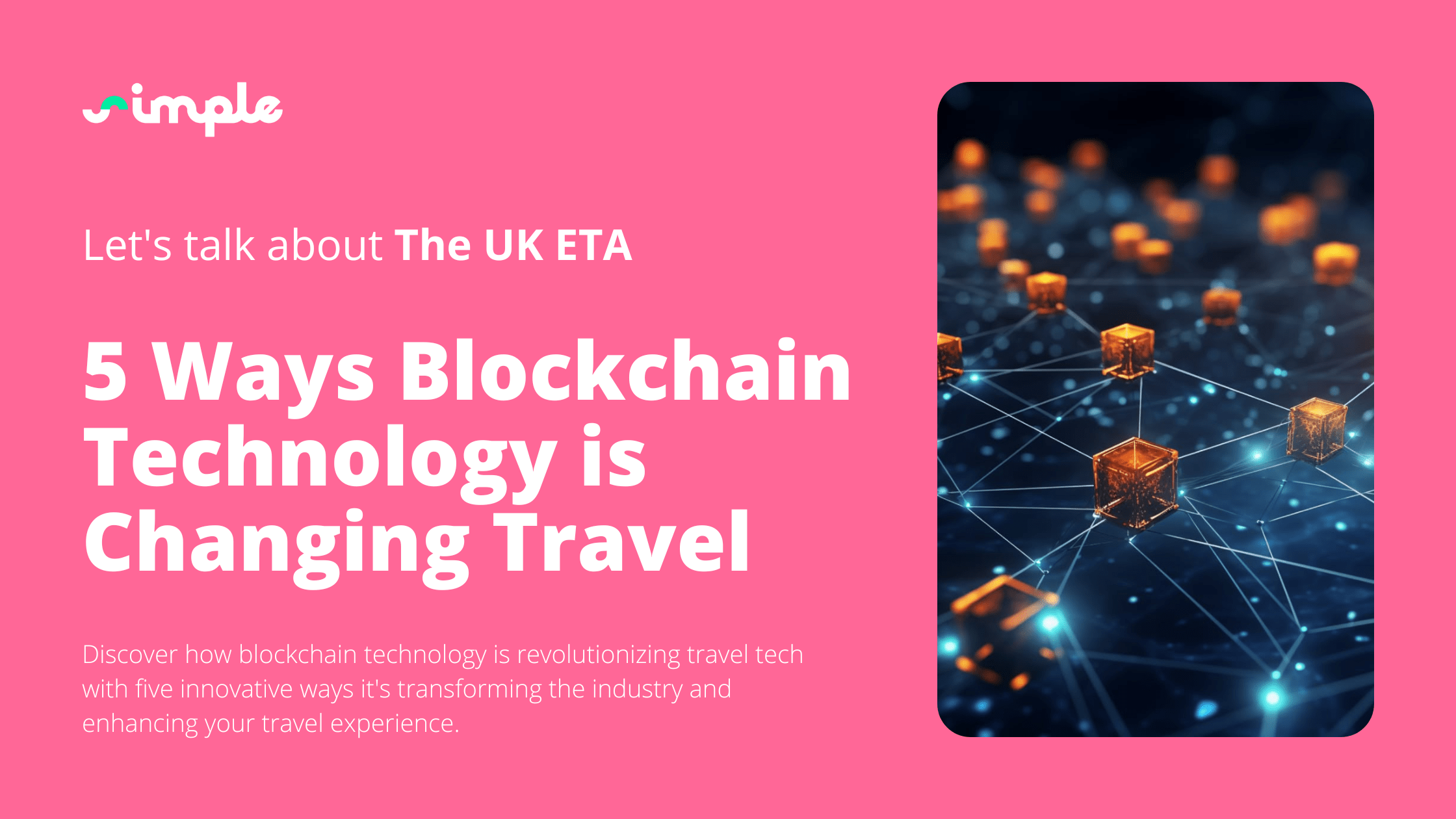5 Ways Blockchain Technology is Changing Travel

Blockchain technology is rapidly gaining traction across various industries, revolutionizing the way businesses operate and interact with consumers. Its decentralized and secure nature offers a myriad of possibilities, particularly in sectors that rely heavily on data integrity and transparency. The travel industry, known for its dynamic and ever-evolving landscape, is no exception. As technological advancements continue to enhance travel experiences, blockchain emerges as a pivotal force in reshaping how we explore the world. From streamlining operations to enhancing security, blockchain’s impact on travel is profound and multifaceted.
In the realm of travel tech, blockchain is not just a buzzword but a transformative tool that is redefining the industry’s core processes. By offering solutions that address long-standing challenges, such as data management and transaction security, blockchain is paving the way for more efficient and reliable travel experiences. As we delve into the ways blockchain is changing travel, it becomes evident that this technology is not only enhancing current systems but also setting the stage for future innovations. For more insights into the latest travel tech advancements, visit SimpleVisa.

Enhancing Security and Transparency
Protection of Travelers’ Personal Data
In an era where data breaches and identity theft are rampant, the travel industry faces significant challenges in safeguarding travelers’ personal information. Blockchain technology offers a robust solution through its immutable ledgers, which ensure that once data is recorded, it cannot be altered or deleted. This feature is particularly beneficial for protecting sensitive traveler data, such as passport details and payment information, from unauthorized access and tampering.
By leveraging blockchain’s secure data management capabilities, travel companies can significantly reduce incidents of identity theft. The decentralized nature of blockchain means that data is not stored in a single location, making it less vulnerable to hacking attempts. Instead, data is distributed across a network of computers, each holding a copy of the ledger. This distribution not only enhances security but also ensures that any attempt to alter the data would require simultaneous changes across the entire network, a feat that is virtually impossible to achieve.
Transparent Booking Systems
Blockchain technology is revolutionizing online booking platforms by introducing transparent and secure systems that eliminate data discrepancies. Traditional booking systems often suffer from issues such as overbooking and hidden fees, which can lead to traveler dissatisfaction. With blockchain, real-time peer-to-peer transactions are recorded on a public ledger, providing a transparent view of all bookings and transactions.
This transparency boosts traveler confidence, as they can verify the authenticity of their bookings and ensure that there are no hidden charges. Additionally, blockchain’s ability to provide a single source of truth means that all parties involved in a transaction, from airlines to hotels, have access to the same information. This reduces the likelihood of disputes and enhances the overall booking experience.
Improved Tracking of Travel History
Blockchain technology also offers significant improvements in tracking travel history. By creating verifiable travel itineraries, blockchain ensures that travelers have a reliable record of their journeys. This is particularly useful for frequent travelers who need to keep track of multiple trips and itineraries.
Moreover, blockchain streamlines verification processes at checkpoints, such as airports and border controls. With a secure and verifiable record of travel history, travelers can pass through checkpoints more efficiently, reducing wait times and enhancing the overall travel experience. This capability is especially beneficial in the context of travel management software, where accurate and up-to-date travel data is crucial for effective planning and decision-making.

Revolutionizing Payment Systems
Introduction of Cryptocurrency in Travel Payments
The integration of cryptocurrency into travel payments is a groundbreaking development that is reshaping the financial landscape of the travel industry. By allowing travelers to use digital currencies, such as Bitcoin and Ethereum, blockchain technology is enabling them to bypass traditional currency exchange issues. This is particularly advantageous for international travelers who often face fluctuating exchange rates and high conversion fees. With cryptocurrency, travelers can make payments directly in a digital format, ensuring a seamless and cost-effective transaction process.
Moreover, the use of cryptocurrency facilitates faster cross-border transactions. Traditional banking systems can take several days to process international payments, often leading to delays and inconveniences. In contrast, blockchain’s decentralized network allows for near-instantaneous transactions, regardless of geographical boundaries. This speed and efficiency are crucial in the fast-paced travel industry, where timely payments can significantly enhance the customer experience.
Reducing Transaction Fees
One of the most significant advantages of blockchain in travel is its ability to reduce transaction fees. Traditional payment systems often involve multiple intermediaries, each taking a cut of the transaction, which can lead to high costs for both providers and consumers. Blockchain technology eliminates the need for these intermediaries by enabling direct peer-to-peer transactions. This reduction in middlemen translates to lower transaction fees, providing substantial savings for all parties involved.
For travel providers, these savings can be reinvested into improving services and offerings, while consumers benefit from more affordable travel options. The cost-effectiveness of blockchain-based transactions is a key driver behind the growing adoption of digital travel solutions and travel tech innovations. As more companies embrace this technology, the travel industry is poised to become more accessible and affordable for a broader audience.
Loyalty Program Innovations
Blockchain technology is also transforming loyalty programs within the travel sector. Traditionally, loyalty programs have been complex and fragmented, with travelers often struggling to earn and redeem rewards across different platforms. Blockchain addresses these challenges through the tokenization of reward points, creating a unified and transparent system for managing loyalty programs.
By converting reward points into digital tokens, blockchain simplifies the process of earning and redeeming rewards. Travelers can easily track their points and use them across various platforms, enhancing the overall value and appeal of loyalty programs. This innovation not only benefits consumers but also encourages brand loyalty, as travelers are more likely to engage with companies that offer flexible and user-friendly reward systems.
Furthermore, the use of blockchain in loyalty programs aligns with broader travel technology trends, such as the rise of smart travel apps and mobile travel applications. By integrating blockchain into these platforms, companies can offer a seamless and cohesive experience that meets the evolving needs of modern travelers.

Streamlining Identity Verification
Digital Identities for Seamless Travel
The advent of blockchain technology is revolutionizing identity verification processes in the travel industry by introducing blockchain-based digital IDs. These digital identities offer a comprehensive and secure method for verifying travelers’ identities in real-time. Unlike traditional identification methods, which rely on physical documents that can be lost or forged, blockchain-based digital IDs are stored securely on a decentralized ledger, ensuring their authenticity and integrity.
With digital identities, travelers can enjoy a seamless travel experience, as their information is readily accessible and verifiable by authorized parties. This innovation is particularly beneficial in the context of travel management software, where accurate and efficient identity verification is crucial for smooth operations. As digital travel solutions continue to evolve, the adoption of blockchain-based digital IDs is set to become a standard practice in the travel tech ecosystem.
Minimizing Wait Times at Travel Checkpoints
One of the most significant pain points for travelers is the long wait times at checkpoints, such as airports and border controls. Blockchain technology addresses this issue by enabling instant passport verifications, significantly reducing the time spent on document checks and manual processes. By storing passport information on a secure blockchain, authorities can quickly verify a traveler’s identity, allowing for faster processing and reduced congestion at checkpoints.
This efficiency is further enhanced by the integration of blockchain with other travel tech innovations, such as smart travel apps and mobile travel applications. These platforms can provide travelers with real-time updates on checkpoint wait times and offer digital solutions for managing travel documents, further streamlining the travel experience. As a result, travelers can enjoy a more efficient and stress-free journey, with minimal disruptions and delays.
Enhancing Traveler Privacy
In addition to streamlining identity verification, blockchain technology also enhances traveler privacy by giving individuals greater control over their personal information. With blockchain, travelers can decide what information to share and with whom, ensuring that their data is only accessible to authorized parties. This level of control is achieved through encrypted storage, which protects personal information from unauthorized access and breaches.
The assurance of data privacy is a critical consideration for travelers, particularly in an age where data breaches are increasingly common. By leveraging blockchain’s secure and transparent framework, the travel industry can build trust with consumers and foster a more secure travel environment. This focus on privacy aligns with broader travel technology trends, as companies seek to offer digital travel solutions that prioritize user security and satisfaction.
As blockchain continues to gain traction in the travel industry, its impact on identity verification processes is expected to grow. By providing a secure, efficient, and privacy-focused solution, blockchain is setting a new standard for identity management in the travel tech ecosystem, paving the way for a more streamlined and secure travel experience.
Simplify Your Travel with Simplevisa
Secure and seamless visa applications online
As blockchain is transforming industries like travel, Simplevisa is making travel planning easier by offering a secure, seamless, and efficient visa application process. Our platform allows you to apply for your visa online, ensuring that your personal information is handled securely and efficiently. You can trust Simplevisa to manage your travel documents, giving you more time to focus on planning.
Conclusion

Blockchain technology is undeniably a transformative force within the travel industry, offering innovative solutions that address long-standing challenges. From enhancing security and transparency to revolutionizing payment systems and streamlining identity verification, blockchain is reshaping the way we travel. Its decentralized and secure nature provides a robust framework for managing sensitive data, ensuring that travelers’ personal information is protected and transactions are conducted with integrity. As the travel industry continues to evolve, the integration of blockchain is set to play a pivotal role in driving digital travel solutions and fostering a more efficient and reliable travel ecosystem.
The potential of blockchain in travel extends beyond immediate operational improvements. It sets the stage for future innovations, encouraging travel tech startups and established companies alike to explore new possibilities and redefine industry standards. By embracing blockchain, the travel industry can enhance its offerings, improve customer satisfaction, and build a more sustainable and resilient future. As travel technology trends continue to evolve, blockchain stands out as a key enabler of progress, offering a pathway to a more connected and secure travel experience.
For travelers and providers, the adoption of blockchain technology represents an opportunity to embrace change and enhance the overall travel experience. By leveraging blockchain’s capabilities, travelers can enjoy greater security, efficiency, and convenience, while providers can streamline operations and reduce costs. The shift towards blockchain-based solutions is not just a technological advancement but a strategic move towards a safer and more efficient travel industry.
As the benefits of blockchain become increasingly apparent, it is crucial for all stakeholders to actively engage with this technology and explore its potential. By doing so, the travel industry can unlock new opportunities for growth and innovation, ultimately delivering a superior experience for travelers worldwide. The journey towards a blockchain-enabled travel ecosystem is just beginning, and its impact promises to be both profound and far-reaching.